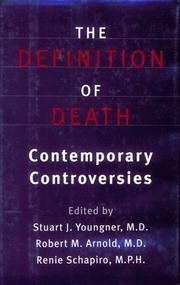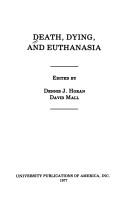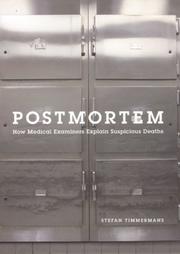| Listing 1 - 4 of 4 |
Sort by
|

ISBN: 0801859859 0801870232 9780801870231 9780801859854 Year: 1999 Publisher: Baltimore Johns Hopkins university press
Abstract | Keywords | Export | Availability | Bookmark
 Loading...
Loading...Choose an application
- Reference Manager
- EndNote
- RefWorks (Direct export to RefWorks)
Brain death. --- Death --- Proof and certification. --- Brain death --- Certification of death --- Death registration --- Determination of death --- Death (Biology) --- Absence and presumption of death --- Death certificates --- Cerebral death --- Irreversible coma --- Coma --- Proof and certification --- Certification --- Determination

ISBN: 0890931399 Year: 1980 Publisher: Frederick : University publications of America,
Abstract | Keywords | Export | Availability | Bookmark
 Loading...
Loading...Choose an application
- Reference Manager
- EndNote
- RefWorks (Direct export to RefWorks)
Euthanasia --- Right to die --- Death --- -Terminal care --- #GROL:SEMI-241.63*4 --- End-of-life care --- Terminally ill --- Care of the sick --- Critical care medicine --- Dying --- End of life --- Life --- Terminal care --- Thanatology --- Death, Right to --- Death with dignity --- Natural death (Right to die) --- Life and death, Power over --- Advance directives (Medical care) --- Do-not-resuscitate orders --- Suicide --- Assisted death (Euthanasia) --- Assisted dying (Euthanasia) --- Death, Assisted (Euthanasia) --- Death, Mercy --- Dying, Assisted (Euthanasia) --- Killing, Mercy --- Mercy death --- Mercy killing --- Homicide --- Medical ethics --- Assisted suicide --- Proof and certification --- Care and treatment --- Medical care --- Philosophy --- Euthanasia. --- Right to die. --- Terminal care. --- Proof and certification. --- Certification of death --- Death registration --- Determination of death --- Certification --- Determination --- Death (Biology) --- Absence and presumption of death --- Death certificates
Book
ISBN: 0231043066 0231043074 9780231043069 9780231043076 Year: 1977 Publisher: New York (N.Y.): Columbia university press,
Abstract | Keywords | Export | Availability | Bookmark
 Loading...
Loading...Choose an application
- Reference Manager
- EndNote
- RefWorks (Direct export to RefWorks)
Attitude to Death. --- Death. --- Ethics, Medical. --- Euthanasia. --- Suicide. --- 241.63*4 --- Death --- -Euthanasia --- -Suicide --- -Terminal care --- -Killing oneself --- Self-killing --- Right to die --- Assisted death (Euthanasia) --- Assisted dying (Euthanasia) --- Death, Assisted (Euthanasia) --- Death, Mercy --- Dying, Assisted (Euthanasia) --- Killing, Mercy --- Mercy death --- Mercy killing --- Homicide --- Medical ethics --- Assisted suicide --- Dying --- End of life --- Life --- Terminal care --- Terminally ill --- Thanatology --- Suicides --- Euthanasia, Involuntary --- Involuntary Euthanasia --- Mercy Killing --- Killings, Mercy --- Mercy Killings --- Right to Die --- Suicide, Assisted --- Bioethical Issues --- Medical Ethics --- Medicine --- Professionalism --- Bioethics --- Cardiac Death --- Determination of Death --- Near-Death Experience --- Death, Cardiac --- Fatal Outcome --- Attitudes to Death --- Death, Attitude to --- Death, Attitudes to --- End-of-life care --- Care of the sick --- Critical care medicine --- Theologische ethiek: euthanasie --- Proof and certification --- Moral and ethical aspects --- Causes --- Philosophy --- ethics --- Care and treatment --- Medical care --- Euthanasia --- Suicide --- Proof and certification. --- Moral and ethical aspects. --- -Theologische ethiek: euthanasie --- 241.63*4 Theologische ethiek: euthanasie --- -241.63*4 Theologische ethiek: euthanasie --- Killing oneself --- Attitude to Death --- Ethics, Medical --- Certification of death --- Death registration --- Determination of death --- Death (Biology) --- Absence and presumption of death --- Death certificates --- Certification --- Determination --- End Of Life --- End-Of-Life

ISBN: 1281966673 9786611966676 0226804003 9780226804002 9781281966674 0226803988 6611966676 9780226803982 9780226803999 0226803996 Year: 2006 Publisher: Chicago, Ill. University of Chicago Press
Abstract | Keywords | Export | Availability | Bookmark
 Loading...
Loading...Choose an application
- Reference Manager
- EndNote
- RefWorks (Direct export to RefWorks)
"Postmortem goes deep inside the world of medical examiners to uncover the intricate web of pathological, social, legal, and moral issues in which they operate. Stefan Timmermans spent years in a medical examiner's office, following cases, interviewing examiners, and watching autopsies. While he relates fascinating cases here, he is also more broadly interested in the cultural authority and responsibilities that come with being a medical examiner. Although these professionals attempt to remain objective, medical examiners are nonetheless responsible for evaluating subtle human intentions. Consequently, they may end - or start - criminal investigations, issue public health alerts, and even cause financial gain or harm to survivors. How medical examiners speak to the living on behalf of the dead, is Timmermans's subject, revealed here in the day-to-day lives of the examiners themselves."--BOOK JACKET.
Forensic sciences. --- Criminal investigation. --- Autopsy. --- Death --- Medical examiners (Law) --- Certification of death --- Death registration --- Determination of death --- Death (Biology) --- Absence and presumption of death --- Death certificates --- Autopsy --- Vital statistics --- Necropsy --- Necroscopy --- Post-mortem examinations --- Postmortem examinations --- Postmortems --- Anatomy, Pathological --- Dead bodies (Law) --- Human dissection --- Medical jurisprudence --- Post-mortem examiners --- Postmortem examiners --- Forensic scientists --- Public officers --- Coroners --- Forensic pathology --- Crime detection --- Crime investigation --- Criminal investigations --- Detection of crime --- Investigations --- Law enforcement --- Crime scenes --- Detectives --- Forensic sciences --- Suspects (Criminal investigation) --- Criminalistics --- Forensic science --- Science --- Criminal investigation --- Causes. --- Proof and certification. --- Certification --- Determination --- Causes --- Informers --- Sociology of culture --- Legal medicine --- Medical examiners (Law). --- Cause of Death --- Coroners and Medical Examiners --- Forensic Medicine --- #SBIB:314H223 --- Medicine, Forensic --- Medicine, Legal --- Legal Medicine --- Jurisprudence --- Law Enforcement --- Biometric Identification --- DNA Contamination --- Examiner, Medical --- Examiners, Medical --- Medical Examiner --- Medical Examiners and Coroners --- Medical Examiners --- Coroner --- Causes of Death --- Death Cause --- Death Causes --- Proof and certification --- Sterfteoorzaken --- medicine, medical, doctor, professional, career, death, dying, end of life, crime, criminal, sociology, sociological, academic, scholarly, autopsy, certification, laws, legal, science, scientific, training, america, american, csi, forensics, forensic, questions, answers, pathology, social, morals, cases, proof, suspicious, heart disease, suicide, trial, credibility, parents, organs, tissue, black market.
| Listing 1 - 4 of 4 |
Sort by
|

 Search
Search Feedback
Feedback About UniCat
About UniCat  Help
Help News
News